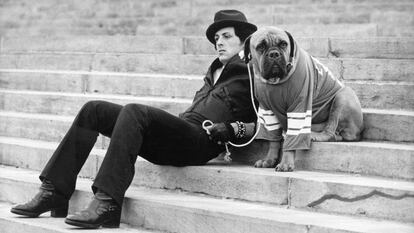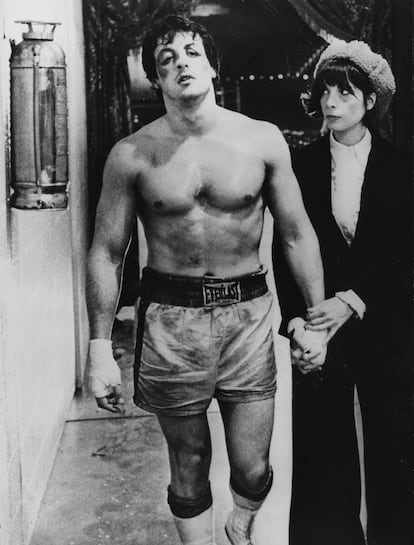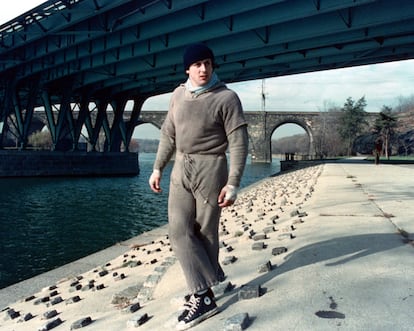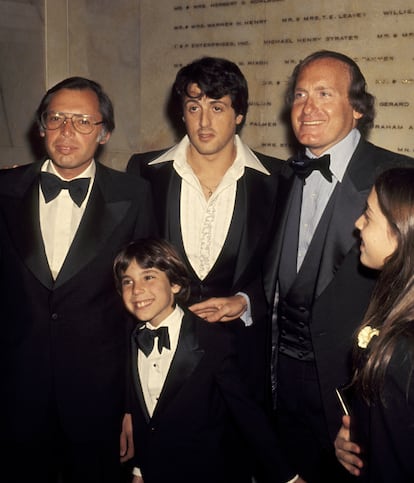Sylvester Stallone: How childhood rejection and bullying led the legendary actor to create ‘Rocky’
The performer’s difficult youth inspired him to write and star in the classic boxing movie, starting an enduring franchise and launching a long and legendary career

Recently, instead of retiring, old action heroes have been popping up again on the big screen and streaming platforms. These men (and women) in their 60s and beyond continue to battle like they always have. Sylvester Stallone, 76, is leading the charge. In 2022, the actor returned to his roots as a working-class superhero in Samaritan and starred in the crime series Tulsa King. He also served as a producer of the third installment of Creed, a successful spin-off of Rocky, the unlikely crown jewel of Stallone’s prosperous career and the movie that started it all. Stallone did not just star in the film but wrote the screenplay for it as well. The script for Rocky reached producers Irwin Winkler and Robert Chartoff with a single condition: the screenwriter would also play the main character. At the time, Stallone had only appeared in The Lords of Flatbush (1974), an independent film about a Brooklyn street gang. The producers saw it and enthusiastically accepted the stipulation, believing that Perry King, the handsome blonde with a square jaw, was the screenwriter. Their illusion was shattered when they learned that Stallone, a dark-haired beefcake, was the one who had written the script.
The producers balked. They warned that they would only shoot the film if Ryan O’Neal played the titular role and offered Stallone $180,000 to stay home. It was an irresistible deal for someone in his situation. He only had $106 in his bank account, his wife was pregnant with their first child (Sage, the star of the fifth installment of the Rocky franchise, who died in 2012) and he had sold his dog Butkus because he couldn’t afford to keep him. Still, Stallone said no. Aware of the potential of the goodhearted fable in which boxing served as a backdrop, the producers increased their offer to $360,000. Again, Stallone refused. ‘’I told my wife that I’d rather bury it in the back yard and let the caterpillars play Rocky. I would have hated myself for selling out, the way we hate most people for selling out. My wife agreed, and said she’d be willing to move to a trailer in the middle of a swamp if need be,’” he explained to The New York Times after the premiere.

The film’s storyline came to Stallone as if by magic after he saw a fight between Muhammad Ali and Chuck Wepner, a boxer who counted his fights by knockouts; when he was on the verge of retiring, Wepner had the opportunity to face the legendary champion, an unequal battle in which he even managed to put Ali on the mat once, much to the astonishment of the spectators. “I was watching the fight and I said to myself, ‘Let’s talk about stifled ambition and broken dreams and people who sit on the curb looking at their dreams go down the drain.’” He locked himself in his house and wrote. Wepner became Rocky Balboa, so named after boxer Rocky Marciano and Spanish explorer Vasco Núñez de Balboa. Stallone wrote 90 pages in three days; the writing came easily because that tale of heroes facing their own destiny was also his own story.
Stallone’s struggles began at birth. In a forceps accident, the doctor who delivered him inadvertently cut his facial nerve, leaving his lip, chin and half of his tongue partially paralyzed for life. That injury caused a speech impediment, which made him vulnerable to the neighborhood bullies. They made fun of his looks, his voice and even his name; to ridicule him, they called him Sylvia.
His family environment was equally turbulent. For better or worse, his mother, Jackie Stallone, was a force of nature; she was an astrologist, trapeze artist, entrepreneur, fortune teller and Big Brother contestant. His father, Frank Stallone, was a polo player with anger management issues. According to Jackie Stallone, “[Stallone’s father] was the most sadistic man God has ever allowed on this earth… He would whip Sylvester with a polo crop until he bled.”
But the worst mistreatment Stallone faced from his dad was not physical. “Why can’t you be smarter, you’ll never be anything, you’re born with paralysis, why don’t you join the Navy, you’ll never make it in school,” his father used to tell him. One of Frank Stallone’s cruelest phrases eventually crept into the Rocky script: “You were born without much brain, so you better start using your body.” Sylvester only half-heartedly heeded his father’s advice. He had an epiphany after seeing Steve Reeves play Hercules in an old film on TV. The next day, he went to a junkyard and turned a car axle into his first set of weights. He sculpted his body into a perfect machine, but the boy who taped himself reciting Walt Whitman to correct his speech impediment also wanted to prove he had a brain.

Stallone has always been underestimated. His mother suspected that her son had a special hidden talent (as all mothers do) and took him to a guidance counselor for advice on a future career. The response was quite specific: “Your son is suited to run a sorting machine or to be an assistant electrician, primarily in the area of elevator operations.” But Stallone had other plans. He rented a cheap apartment in Manhattan and started to frequent theaters. He made his debut playing a minotaur in the only play Picasso ever wrote. He wanted to be an actor, but he longed to be a screenwriter even more. “A writer creates work for 300 people and entertainment for three million, so who is the most important person in a movie?” he said. He painted the windowpanes in his home black so he wouldn’t know if it was night or day, cut off his phone and lights, and wrote doggedly by candlelight. By the time he finished Rocky, he had already written a dozen other scripts.
Memories of those hardships helped keep Stallone going until the producers finally relented and agreed to let him play the lead role. In exchange, the amount of money he was offered dropped dramatically: he only received $20,000 for the script and $625 a week for playing the lead. The previous $6 million was reduced to $1 million, a paltry budget for a Hollywood production. “The studio didn’t want to make the film,” Winkler acknowledged. “But the whole idea of it, a fight film, was not particularly something people would go see without a star in it… Plus, these were not the most attractive people in the world.” To cut costs, Stallone cast family members in some of the roles: his father Frank is the man who rings the bell before each fight, his brother Frank Jr. plays a street singer and his then-wife Sasha appeared as a photographer. The movie’s location was non-negotiable; it would be set in Philadelphia, a city that represented the working class, and it was a place where Stallone spent part of his childhood.

The film was shot on the streets, guerrilla style. The surprise with which passersby observe Rocky as he runs through the market is authentic, as is the moment when a shopkeeper throws him a piece of fruit, which was not in the script. Adrian and Rocky’s first date was at an empty ice rink because the budget didn’t allow for extra frills. The fluidity of the iconic training sequences was achieved with a rudimentary Steadicam, an invention that, at the time, had only been used in two prior films but would change how the sport was filmed. On the positive side, the advance money allowed Stallone to reunite with his dog Butkus, who became part of the cast as well.
Everything ran like a well-oiled machine, from the now-iconic soundtrack composed by Bill Conti – chosen because it was the cheapest option – to the chemistry between the leads. Susan Sarandon had been the first choice to play Adrian, but she was too pretty. Talia Shire, Francis Ford Coppola’s sister, was selected for the role. “I’d just had a baby when that script came in the mail. I had no idea who this person was who wrote it. But it was brilliant– the language, the written text of that piece, the poetry that Sylvester composed. He had truly created a folk myth.”
As the premiere approached, the movie started to generate buzz. People began to think that maybe it wasn’t going to be the flop everyone was predicting. “I thought it was going to be at the bottom half of a bill at some drive-in in Mississippi,” said Rocky director John G. Avildsen. “But then it opened at this East Side art-house cinema on 3rd Avenue, and there was a line around the block. That’s when it began to sink in.” But it wasn’t just a popular hit movie; Rocky garnered critical praise as well. “On paper, neither character may seem terribly appealing, but on the screen, they steal your heart away,” wrote Arthur Knight in his review for the Hollywood Reporter. Producer Irvin Winkler believes that the film came out at the right time: Rocky “offered us relief from all that was going on in the ‘70s, with Watergate, the Vietnam War, the youth uprising. Rocky gave us an optimistic look at the future.”
The film grossed $225 million and received ten Oscar nominations. Stallone himself received two nominations, making him only the third actor after Charles Chaplin and Orson Welles to be nominated in both the screenplay and acting categories. On the night of the Academy Awards, Stallone’s film competed with Taxi Driver, All the President’s Men and Network, but the name Jack Nicholson announced when he opened the envelope was.... Rocky. If that narrative twist had been part of a screenplay, it would have been unbelievably cloying. Rocky also won Best Editing and Best Director Academy Awards. Stallone didn’t take home any Oscars himself, but he was the night’s big winner. He had finally been able to prove himself in front of everyone. Stallone has said that his looks often defined what people thought of him. “Here was this crudity coming into Hollywood through the back door. Muscles right away denote stupidity; if you’re physical you can’t be bright. It was the same thing with Marilyn Monroe, who wasn’t stupid. This has been the bane of my existence,” he explained.

But success had its price. Suddenly, everyone wanted a piece of him. Some theaters re-released Woody Allen’s Bananas, in which the actor appears for only a few seconds, as “a Sylvester Stallone movie.” More controversial was the resurfacing of the softcore pornographic film that he had shot in the 1970s when he was at his lowest point. “I was also starving when I did it. I’d been bounced out of my apartment and had spent four nights in a row at the Port Authority Bus Terminal, trying to avoid the cops, trying to get some sleep, and keeping my pens and books in a 25-cent locker.” He had nothing to lose, so he showed up for the role, which guaranteed him $200 for two days. “The fact that I had to take off my clothes to do it was no big deal. There wasn’t any hard-core stuff in the movie, so what did I care??”
Stallone’s porn film The Party at Kitty and Stud’s was so bad that it was never released, but after Rocky’s success, the producers sought to blackmail him. “I think they asked for $100,000, but I wouldn’t buy it for two bucks, and my lawyer told them to hit the pike. You know, when you’re hungry, you do a lot of things you wouldn’t ordinarily do, and it’s funny how you can readjust your morality for the sake of self-preservation.” The movie was eventually released as The Italian Stallion, a pun on Rocky’s nickname. But the film was so softcore that, unlike other career-destroying erotic films, it didn’t blemish Stallone’s storied career. He remains a legend to this day.
Sign up for our weekly newsletter to get more English-language news coverage from EL PAÍS USA Edition
Tu suscripción se está usando en otro dispositivo
¿Quieres añadir otro usuario a tu suscripción?
Si continúas leyendo en este dispositivo, no se podrá leer en el otro.
FlechaTu suscripción se está usando en otro dispositivo y solo puedes acceder a EL PAÍS desde un dispositivo a la vez.
Si quieres compartir tu cuenta, cambia tu suscripción a la modalidad Premium, así podrás añadir otro usuario. Cada uno accederá con su propia cuenta de email, lo que os permitirá personalizar vuestra experiencia en EL PAÍS.
¿Tienes una suscripción de empresa? Accede aquí para contratar más cuentas.
En el caso de no saber quién está usando tu cuenta, te recomendamos cambiar tu contraseña aquí.
Si decides continuar compartiendo tu cuenta, este mensaje se mostrará en tu dispositivo y en el de la otra persona que está usando tu cuenta de forma indefinida, afectando a tu experiencia de lectura. Puedes consultar aquí los términos y condiciones de la suscripción digital.









































